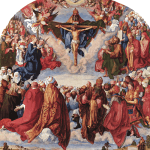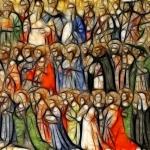François Turretin (1623-1687) was a Genevan-Italian Reformed scholastic theologian and renowned defender of the Calvinistic (Reformed) orthodoxy represented by the Synod of Dort, and was one of the authors of the Helvetic Consensus (1675). He is generally considered to be the best Calvinist apologist besides John Calvin himself. His Institutes of Elenctic Theology (three volumes, Geneva, 1679–1685) used the scholastic method. “Elenctic” means “refuting an argument by proving the falsehood of its conclusion.” Turretin contended against the conflicting Christian perspectives of Catholicism and Arminianism. It was a popular textbook; notably at Princeton Theological Seminary, until it was replaced by Charles Hodge‘s Systematic Theology in the late 19th century. Turretin also greatly influenced the Puritans.
This is a reply to a portion of Institutes of Elenctic Theology (Vol. 2, Eleventh Topic: The Law of God, Seventh Question: The First Commandment), in which he addresses the communion of saints, including the invocation and veneration of saints. I utilize the edition translated by George Musgrave Giger and edited by James T. Dennison, Jr. (Presbyterian and Reformed Publishing Company, Phillipsburg, New Jersey: 1992 / 1994 / 1997; 2320 pages). It uses the KJV for Bible verses. I will use RSV unless otherwise indicated. All installments of this series of replies can be found on my Calvinism & General Protestantism web page, under the category, “Replies to Francois Turretin (1632-1687).” Turretin’s words will be in blue.
*****
[T]hey order to invoke in the article of death whatever saint anyone has been most devoted to in life, after this manner: “O most glorious Saint or Saintess, N., I have always reposed in the particular hope and confidence while I have lived, succor me now struggling in this time of extreme necessity” (Hortu. ani.+).
Yeah, sure. This is, of course, no different from going to the holy man or woman and asking them to pray, according to the principle laid down by James:
James 5:16-17 . . . The prayer of a righteous man has great power in its effects. [17] Eli’jah was a man of like nature with ourselves and he prayed fervently that it might not rain, and for three years and six months it did not rain on the earth.
If you met a man like that, who is so powerful that he can make the rain stop for 3 1/2 years, you would tend to go to him repeatedly. Would it not follow, then, that Elijah seemed to have a particular influence over weather? Therefore, why couldn’t someone ask him to pray to God about the weather, rather than someone else, since he had this record of asking for rain to cease, and it did for three and-a-half years? So he became, in effect, the “patron saint of meteorological petitions.”
We do roughly the same in this life with friends, on the level of empathy. So, for example, if a woman has difficulty with miscarriage or difficult pregnancies or deliveries, she might go to a woman who has experienced the same thing and ask her to pray to God for her. I don’t see any intrinsic difficulty here. Why should it be any different for saints after death? If one has been particularly helpful in prayer, then we would go to them again and again, just as the ancient Hebrews went to Moses to pray for them.
Adoration is not synonymous with worship. In Catholicism it is reserved for God alone. We don’t adore anyone else. Turretin his very sloppy in his word selection (or his English translator is lax and irresponsible in his bias).
These they also make three: divine, to which the kind of worship they call “latria” answers; human, which is placed in the various dignities, powers and degrees of men, to which cultus civilis or that of human observance corresponds; intermediate, arising from grace and glory and answering the third kind of worship, which they call “dulia.” The latter is either simple (afforded to saints and angels) or “hyperdulia” (given to the humanity of Christ considered apart, although united to the Word; and to the blessed virgin, which they hold to be religious).
He explains that the different levels of Catholic reverence are perfectly plausible (“not improperly constituted”), yet turns around at the end and states that, nonetheless, it is “serious error.” No Scripture is given at all to back up these contentions. Therefore, at least so far, it’s a bald, empty claim to which no one ought to owe any allegiance.
XI. For the worship of God alone (against the invocation of saints and the worship of creatures), the orthodox contend: First, with express command of God by which he forbids having any other gods before himself—“thou shalt have no other gods before me” (Ex. 20:3) or as the Septuagint has it “besides me” (plēn emou).
I critiqued this line of reasoning last time. Invocation of saints is imply not idolatrously placing them in the place of God. The question is whether it’s a right or wrong practice. I also showed last time, right from Jesus, that it was: (the rich man making petitionary requests of Abraham and the latter not rebuking them as impossible and impermissible: Luke 16). If Jesus thought it was permissible, it’s certainly not idolatrous or sinful in any way.
Here the Lord decrees that nothing should be religiously worshipped except himself, the alone and supreme God.
That’s right; and asking saints to intercede is not worship; it’s prayer.
Genesis 19:1 The two angels came to Sodom in the evening; and Lot was sitting in the gate of Sodom. When Lot saw them, he rose to meet them, and bowed himself with his face to the earth,
Proskuneo occurs 179 times in 172 verses in the LXX, including for worship and adoration of God (e.g., Gen 24:26, 48. 52; Ex 33:10; 34:14; 1 Sam 15:25; Neh 8:6), veneration of men (e.g., Ex 18:7; 1 Sam 24:8; 2 Sam 9:6; 14:33), and veneration of angels (Gen 19:1). But Turretin, seemingly unaware of all this (which is remarkable ignorance for such an eminent scholar) wrote: “proskynēsin as well as latreian is due to God alone.” It’s not true, folks.
We see angels bowed to (venerated) elsewhere in the New Testament, with no rebuke at all:
Luke 24:4-5 While they were perplexed about this, behold, two men stood by them in dazzling apparel; [5] and as they were frightened and bowed their faces to the ground, the men said to them, “Why do you seek the living among the dead?”
The prophet Daniel venerates an angel (seemingly Gabriel: see v. 16) without “controversy”:
Daniel 8:15, 17 When I, Daniel, had seen the vision, I sought to understand it; and behold, there stood before me one having the appearance of a man. . . . 17] So he came near where I stood; and when he came, I was frightened and fell upon my face. But he said to me, “Understand, O son of man, that the vision is for the time of the end.”
In several other instances, men are also bowed down to and venerated, with no disapproval in the text; for example, Paul and Silas (Acts 16:29) and Daniel (Dan 2:46-48; by the king!). The Greek word for “fell down before” in Acts 16:29 is prospipto (Strong’s #4363). It is also used of worship of Jesus in five passages (Mk 3:11; 5:33; 7:25; Lk 8:28, 47). But where men are involved, the meaning is honor, or veneration. This word occurs seven times in LXX, including for Esau’s greeting of Jacob (Gen 33:4), Esther before a king (Est 8:3), but also for worship of God (Ps 95:6).
Note that the word “worship” doesn’t appear in any of the passages I have brought forth in favor of veneration. When “worship” does appear in connection with a man or angel, it isn’t permitted:
Acts 10:25-26 When Peter entered, Cornelius met him and fell down at his feet and worshiped him. [26] But Peter lifted him up, saying, “Stand up; I too am a man.”
We see the same “category mistake” in Revelation 19:10 and 22:8-9, and also when men thought that Paul and Barnabas were Zeus and Hermes and “wanted to offer sacrifice.” They were rebuked, as mistaken (Acts 14:11-18).
The same can be found with regard to “honor”. Turretin says it “belongs to God alone.” Well yes: the highest honor is, of course, for Him alone. But it doesn’t follow that no one else is honored. God even shares His glory with men. “Honor” in RSV occurs 69 times in the NT, and is used with reference to God (Jn 5:23; Phil 1:20; 1 Tim 1:17; 6:16; Heb 2:7, 9; 2 Pet 1:17; Rev 4:9, 11; 5:12-13; 7:12), and also to men (Mt 15:4; 19:19; Lk 18:20; Jn 12:26 [here God honors men]; Rom 2:10; 12:10; 13:7; Phil 2:29; 1 Tim 5:3, 17; 6:1; 1 Pet 2:17; 3:7). Once again, Turretin indulges in unbiblical false dichotomies.
Based on this abundant biblical indication, we conclude (as Catholics always have) that worship / adoration is reserved for God alone, while veneration / honor is to be offered to the holy angels and worthy, saintly men (i.e., creatures).
*
*****
*
Photo credit: Ooman (8-31-10). Cave of the Patriarchs in Hebron, Israel [Wikimedia Commons / Creative Commons Attribution-Share Alike 3.0 Unported license]
Summary: As part of my series of replies to Calvinist expositor Francois Turretin, I address the topic of the communion of saints, particularly the issue of veneration.














